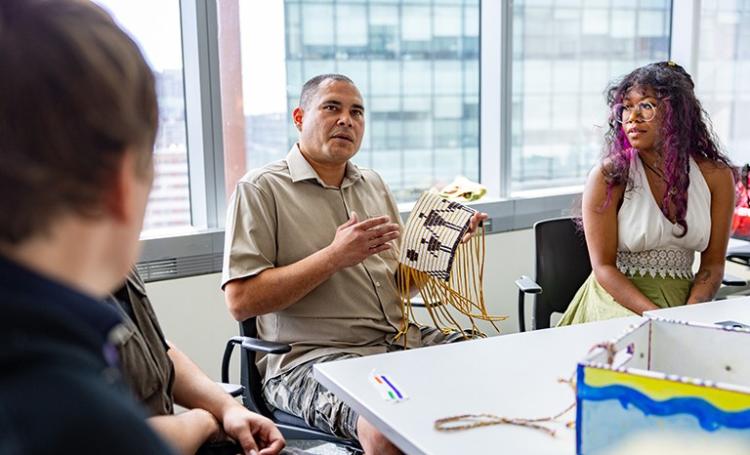Concordia's First Peoples Studies program offered a course this winter highlighting the cultural heritage of wampum belts and their significance in modern society. Under the guidance of Nicolas Renaud, assistant professor and incoming program director, Indigenous and non-Indigenous students explored the history behind the traditional art form.
Wampum belts, made from shells such as purple quahogs and white whelk shells, have a long history among some Indigenous peoples of North America. These belts were used for ceremonial, diplomatic and historical purposes. They served as a means of communication and memory preservation, recounting stories, treaties and alliances between Indigenous nations as well as with European colonies.
Experiential immersion in history
Advanced Topics in First Peoples Studies: Wampum Belts (FPST 498) was an immersive experience, offering students an opportunity to explore Indigenous culture through the creation of art projects inspired by wampum belts. With the support of Renaud, himself an Indigenous artist, students were able to express their creativity while honouring traditions.
The resulting works reflect the students' personal engagement with the teachings and language of wampum.
In addition to creating wampum belts, students delved into the history and meaning of these pieces. They learned about traditional manufacturing techniques, associated stories and beliefs and their cultural significance.
"We explored the political and philosophical visions inscribed in wampum belts, particularly within Wendat and Haudenosaunee cultures," Renaud explains.
"We also explored the idea of living objects that continue to speak and whose principles can still operate in the present world. The student projects offered an eloquent demonstration of this power of wampum, each charging the chosen materials and techniques with meaning, and composing a visual language to symbolize relationships, whether with a community, a territory or a family."

Weaving together cultures
Renaud's teaching approach was praised by the students, who appreciated his passion, commitment and respect for Indigenous culture. His in-depth knowledge and inclusive style enabled group members of all backgrounds to feel valued and encouraged.
Non-Indigenous students, or those whose Indigenous culture is not linked to the wampum tradition, were invited in their projects to draw on wampum principles to express personal experiences and find links with their own cultural heritage.
"This has been my favourite course at Concordia because it has allowed for a more thorough and truthful understanding of the past and present while also being a creative outlet," says Lexi Trubiano, one of Renaud's students, who is pursuing a major in Political Science and minor in First Peoples Studies.
Her colleague, Zephyriah Roberts, an indigenous student taking a double major in Liberal Arts and First Peoples Studies, adds: "I encountered a richness of oral tradition passing down principles of politics and harmonious society. I feel that studying wampum belts was essential in my studies just as studying literary classics in Liberal Arts."
Pascale Sicotte, dean of the Faculty of Arts and Science, emphasizes that Renaud is determined to continue offering students unique and enriching educational experiences in his new role as director of the First Peoples Studies program.
"Courses like Nicolas's help develop spaces for communication and contact between cultures and are an essential element in building a rich academic environment where multiple perspectives have their place," she explains. Sicotte highlights the faculty's ongoing commitment to the Indigenous Directions Action Plan, as well as the decolonization of the curriculum.
"Nicolas's passion for Indigenous art and his pedagogical approach enable Indigenous and non-Indigenous students alike to better understand the importance of wampum. These students are thus personally contributing to raising awareness of these elements of Indigenous culture in their own environments."
Flip through the photo album of wampum belts created by Nicolas Renaud's Advanced Topics in First Peoples Studies class at Concordia.













